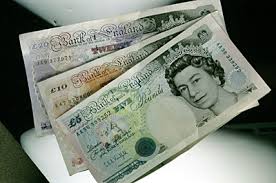Tuesday, 04 August 2015 00:51
 LONDON: Sterling trod water, less than 1 percent off a 7-1/2-year high against the euro on Monday with all eyes on a bumper day of data and Bank of England publications on Thursday that could give the pound another boost. Sterling has risen steadily for four months against the single currency, even as the euro stabilised against the dollar, driven chiefly by a revival of speculation that Britain’s central bank could raise interest rates at the end of this year.
LONDON: Sterling trod water, less than 1 percent off a 7-1/2-year high against the euro on Monday with all eyes on a bumper day of data and Bank of England publications on Thursday that could give the pound another boost. Sterling has risen steadily for four months against the single currency, even as the euro stabilised against the dollar, driven chiefly by a revival of speculation that Britain’s central bank could raise interest rates at the end of this year.
Results of Thursday’s rate decision – published for the first time on the same day – are expected to show at least two, or possibly three, policy committee members voting in favour of a rate hike. Strategists from a number of banks, including Goldman Sachs and France’s Societe Generale, said that put the risks to the downside for the euro against sterling this week, although a number of traders in sterling and money markets were less sure.
“I think Thursday will be a confusing day’s activity,” said the Co-head of Treasury at one large international bank in London, declining to be named.
“The inflation forecasts may well be against any hawkish group on the committee and I still struggle to see how the economy is anywhere near justifying a rise in interest rates.”
Sterling was buffetted along with the dollar by some poorer US sentiment data, published early in the afternoon in London, falling as much as 0.2 percent to 70.41 pence per euro. But by 1556 it had recovered to trade at 70.24 pence, up 0.1 percent. It was around the same amount lower at $ 1.5605. while inching up to 94.1 against a basket of currencies – just off a 7-year high.
As the Bank of England moves closer to raising rates for the first time since 2007, the strength of sterling is one factor causing disagreement among its policymakers over when to pull the trigger.
While the Federal Reserve can afford to ride out concerns over the strength of the dollar given the US economy’s mostly inward focus, the strength of the pound is crucial to UK businesses for whom the euro zone and China are main markets.
As such, this year’s gains should ease any upward pressure on wages, demand and inflation.
Conversely, any further rise in rates would run the risk of sending sterling into the stratosphere and exporters screaming.
“Whenever the Fed or the BoE thinks about tightening conditions, the market does it for them and then they’re back to square one,” says Matt Cobon, Head of Government and FX Investments at Columbia Threadneedle Investments in London.
Markets have ramped up expectations of a rise in British rates several times in the past three years only to be disappointed. Money markets on Monday provided for a 45 percent chance of the BoE moving in December compared to around 70 percent for the Fed.
“Clearly the euro zone has been a net drag on the situation for the BoE. It suffers from a similar situation to the US The difference is it doesn’t have the pricing power of the dollar,” Cobon said.



























